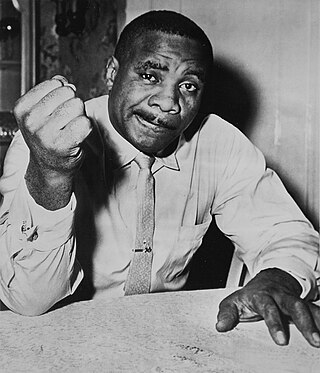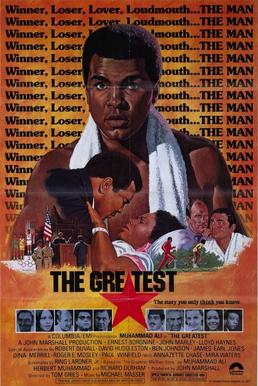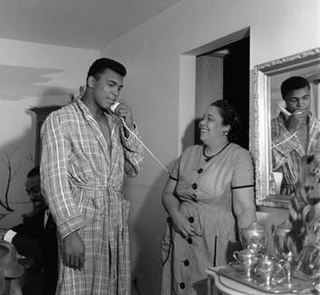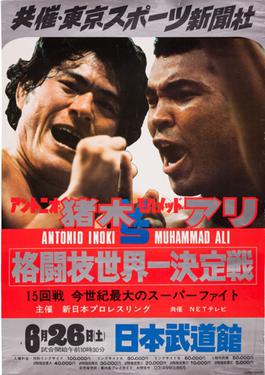
Muhammad Ali was an American professional boxer and activist. Nicknamed "the Greatest", he is regarded as one of the most significant sports figures of the 20th century and is often regarded as the greatest heavyweight boxer of all time. He held the Ring magazine heavyweight title from 1964 to 1970. He was the undisputed champion from 1974 to 1978 and the WBA and Ring heavyweight champion from 1978 to 1979. In 1999, he was named Sportsman of the Century by Sports Illustrated and the Sports Personality of the Century by the BBC.

Charles L. "Sonny" Liston was an American professional boxer who competed from 1953 to 1970. A dominant contender of his era, he became the world heavyweight champion in 1962 after knocking out Floyd Patterson in the first round, repeating the knockout the following year in defense of the title; in the latter fight he also became the inaugural WBC heavyweight champion. Often regarded as one of the greatest boxers of all time, Liston was particularly known for his immense strength, formidable jab, long reach, toughness, and is widely regarded as the most intimidating man in the history of the sport.

Joseph William Frazier, nicknamed "Smokin' Joe", was an American professional boxer who competed from 1965 to 1981. Widely regarded as one of the greatest heavyweight boxers of all time, he was known for his strength, durability, formidable left hand, and relentless pressure fighting style and was the first boxer to defeat Muhammad Ali. Frazier won a gold medal at the 1964 Summer Olympics as an amateur, held the NYSAC heavyweight title from 1968 to 1973, and was the undisputed heavyweight champion from 1970 to 1973.

Ali is a 2001 American biographical sports drama film co-written, produced and directed by Michael Mann. The film focuses on ten years in the life of the boxer Muhammad Ali, played by Will Smith, from 1964 to 1974, featuring his capture of the heavyweight title from Sonny Liston, his conversion to Islam, criticism of the Vietnam War, and banishment from boxing, his return to fight Joe Frazier in 1971, and, finally, his reclaiming the title from George Foreman in the Rumble in the Jungle fight of 1974. It also touches on the great social and political upheaval in the United States following the assassinations of Malcolm X and Martin Luther King Jr.

George Foreman vs. Muhammad Ali, billed as The Rumble in the Jungle, was a heavyweight championship boxing match on October 30, 1974, at the 20th of May Stadium in Kinshasa, Zaire, between undefeated and undisputed heavyweight champion George Foreman and Muhammad Ali. The event had an attendance of 60,000 people and was one of the most watched televised events at the time. Ali won by knockout in the eighth round.

Angelo Dundee was an American boxing trainer and cornerman. Internationally known for his work with Muhammad Ali (1960–1981), he also worked with 15 other world boxing champions, including Sugar Ray Leonard, Sean Mannion, José Nápoles, George Foreman, George Scott, Jimmy Ellis, Carmen Basilio, Luis Manuel Rodríguez, and Willie Pastrano.

Sir Henry Cooper was a British heavyweight boxer. He was undefeated in British and Commonwealth heavyweight championship contests for twelve years and held the European heavyweight title for three years. In a 1963 fight against a young Cassius Clay, he knocked Clay down in Round 4, before the fight was stopped in Round 5 because of a cut to Cooper's eye.

The two fights between Muhammad Ali and Sonny Liston for boxing's World Heavyweight Championship were among the most controversial fights in the sport's history. Sports Illustrated magazine named their first meeting, the Liston–Clay fight, as the fourth greatest sports moment of the twentieth century.
Tunney Morgan Hunsaker was an American professional boxer who is best remembered as the first professional opponent of boxing great Cassius Clay, later known as Muhammad Ali. Outside of his boxing career, Hunsaker served many years as the Police Chief of Fayetteville, West Virginia.

The Greatest is a 1977 biographical sports film about the life of boxer Muhammad Ali, in which Ali plays himself. It was directed by Tom Gries. The film follows Ali's life from the 1960 Summer Olympics to his regaining the heavyweight crown from George Foreman in their famous "Rumble in the Jungle" fight in 1974. The film consists largely of archival footage of Ali's boxing matches used in the screenplay.

The Super Fight was a fictional boxing match between Rocky Marciano and Muhammad Ali shot in 1969 and released in 1970. At the time, Ali and Marciano were the only undefeated heavyweight champions in history and fans often debated who would win had they met in their primes. Ali and Marciano were filmed sparring for 75 one-minute rounds producing several possible scenarios for a genuine fight, with the result claimed to have been determined using probability formulas entered into a computer.

Odessa Lee Clay was the mother of three-time world heavyweight champion Muhammad Ali and Rahman Ali, and the paternal grandmother of Laila Ali. She married Cassius Marcellus Clay Sr. in the 1930s and worked for some time as a household domestic to help support her young children. She supported and inspired her son throughout his boxing career and was a ring-side regular at his bouts.

Muhammad Ali vs. Antonio Inoki, billed as The War of the Worlds, was a fight between American professional boxer Muhammad Ali and Japanese professional wrestler Antonio Inoki, held at the Nippon Budokan arena in Tokyo, Japan, on June 26, 1976. At the time, Ali had come off a knockout victory over Richard Dunn in May and was the undisputed heavyweight boxing champion. Inoki, who had been taught catch wrestling by wrestler Karl Gotch, was staging exhibition fights against champions of various martial arts, in an attempt to show that pro wrestling was the dominant fighting discipline.

A.k.a. Cassius Clay is a 1970 boxing documentary film about the former heavyweight champion Muhammad Ali.

I Am the Greatest is a comedy album by boxer Cassius Clay, released in August 1963 – six months before he won the world heavyweight championship, publicly announced his conversion to Islam, and changed his name to Muhammad Ali. It was released by CBS Columbia. The album helped establish Ali's reputation as an eloquently poetic "trash talker". The album has also been identified as an early example of rap music and a precursor to hip hop music.
In his professional debut, 1960 Olympic light heavyweight boxing champion Cassius Clay fought Tunney Hunsaker in a six-round match on October 29, 1960. Clay won the bout through a unanimous decision on points.
Cassius Clay fought Argentine Alex Miteff in a ten-round boxing match in Louisville on October 7, 1961. Clay won the fight through a technical knockout when the referee stopped the fight in the sixth round. Miteff and Clay would feature in the 1962 film Requiem for a Heavyweight.

Cassius Clay fought an eight-round boxing match with Texan Donnie Fleeman in Miami on February 21, 1961. Prior to this fight, Fleeman had a record of 51 fights with 45 wins including 20 knockouts. Clay won the bout through a technical knockout after the referee stopped the fight in the seventh round. This was the first time Clay had gone over six rounds in a boxing match. It was also the first time Fleeman had ever been knocked down in a boxing match. Fleeman retired from boxing after this fight.
Cassius Clay fought a ten-round boxing match with Don Warner in Miami on February 28, 1962. Clay won the fight through a technical knockout after the referee stopped the fight in the fourth round. Warner would later serve as a sparring partner for Joe Frazier.

Muhammad Ali is widely regarded by many boxing commentators and historians as the greatest heavyweight boxer of all time. Boxing magazine The Ring named him number 1 in a 1998 ranking of greatest heavyweights from all eras. In 1999, The Associated Press voted Ali the number one heavyweight of the 20th century. In 1999, Ali was named the second greatest boxer in history, pound for pound, by ESPN; behind only welterweight and middleweight legend Sugar Ray Robinson. In December 2007, ESPN listed Ali second in its choice of the greatest heavyweights of all time, behind Joe Louis. He was inducted into the International Boxing Hall of Fame in the inaugural class of 1990.
















